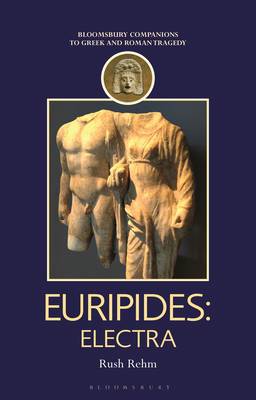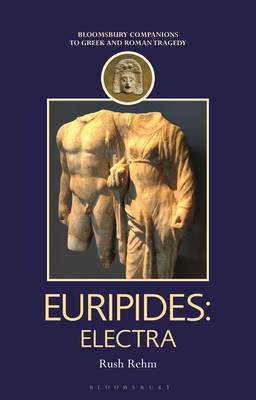
- Afhalen na 1 uur in een winkel met voorraad
- Gratis thuislevering in België vanaf € 30
- Ruim aanbod met 7 miljoen producten
- Afhalen na 1 uur in een winkel met voorraad
- Gratis thuislevering in België vanaf € 30
- Ruim aanbod met 7 miljoen producten
Zoeken
€ 59,45
+ 118 punten
Omschrijving
This new introduction to Euripides' fascinating interpretation of the story of Electra and her brother Orestes emphasizes its theatricality, showing how captivating the play remains to this day. Electra poses many challenges for those drawn to Greek tragedy - students, scholars, actors, directors, stage designers, readers and audiences. Rush Rehm addresses the most important questions about the play: its shift in tone between tragedy and humour; why Euripides arranged the plot as he did; issues of class and gender; the credibility of the gods and heroes, and the power of the myths that keep their stories alive.
A series of concise and engaging chapters explore the functions of the characters and chorus, and how their roles change over the course of the play; the language and imagery that affects the audience's response to the events on stage; the themes at work in the tragedy, and how Euripides forges them into a coherent theatrical experience; the later reception of the play, and how an array of writers, directors and filmmakers have interpreted the original.
Euripides' Electrahas much to say to us in our contemporary world. This thorough, richly informed introduction challenges our understanding of what Greek tragedy was and what it can offer modern theatre, perhaps its most valuable legacy.
A series of concise and engaging chapters explore the functions of the characters and chorus, and how their roles change over the course of the play; the language and imagery that affects the audience's response to the events on stage; the themes at work in the tragedy, and how Euripides forges them into a coherent theatrical experience; the later reception of the play, and how an array of writers, directors and filmmakers have interpreted the original.
Euripides' Electrahas much to say to us in our contemporary world. This thorough, richly informed introduction challenges our understanding of what Greek tragedy was and what it can offer modern theatre, perhaps its most valuable legacy.
Specificaties
Betrokkenen
- Auteur(s):
- Uitgeverij:
Inhoud
- Aantal bladzijden:
- 200
- Taal:
- Engels
- Reeks:
Eigenschappen
- Productcode (EAN):
- 9781350191617
- Verschijningsdatum:
- 30/06/2022
- Uitvoering:
- Paperback
- Formaat:
- Trade paperback (VS)
- Afmetingen:
- 140 mm x 216 mm
- Gewicht:
- 231 g

Alleen bij Standaard Boekhandel
+ 118 punten op je klantenkaart van Standaard Boekhandel
Beoordelingen
We publiceren alleen reviews die voldoen aan de voorwaarden voor reviews. Bekijk onze voorwaarden voor reviews.







